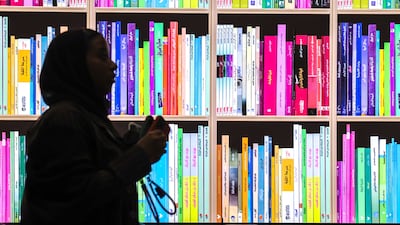The longest Abu Dhabi International Book Fair yet will soon be under way, as it returns to Abu Dhabi National Exhibition Centre. The annual event has been extended and will run from April 26 to May 5.
Booksellers, publishers and authors from around the world will be attending, participating in seminars and presenting the latest titles across several genres. However, classic literature from the Gulf will also be showcased. The event offers a good opportunity to discover gems written by regional authors in the 20th century, as books often reflect the profound social changes that swept the countries in the Gulf around the time of the oil boom.
For example, there's Shajan Bint Al Qadar Al Hazeen, considered to be the first published novel by an Emirati woman. Sara Al Jarwan's 1992 novel follows its eponymous protagonist as she strives for a modern life within a community that respects traditional values. It revolves around themes of identity and cultural belonging, while delving into the evolving role of women in Emirati society.

Another book to note from the UAE is The Diesel by Thani Al Suwaidi. Published in 1994, the novel was ahead of its time in terms of subject matter and style. It tells the story of a teenager who, again, is vying to break from societal expectations. It is written with a stream-of-consciousness grace and leaps into the surreal, with a panoply of thought-provoking characters alongside mystical figures.
Several key novels from Kuwait reflect upon the changes the region went through in the 20th century, often focusing on issues that have been marginalised.
Taleb Al Refai’s seminal 1998 novel Shadow of the Sun, for instance, sheds light on the hardships of migrant workers. It features Helmy, an Egyptian teacher who travels to Kuwait after borrowing a significant amount of money for a visa. His dreams of a better life soon buckle as he becomes embroiled in a series of Kafkaesque catastrophes. Laila Al-Othman's Wasmiyah Leaves The Sea, meanwhile, is a 1986 novel that tackles social and gender conventions with a coming-of-age love story between a girl from a well-to-do Kuwaiti family and her sweetheart Abdullah.
From Bahrain, Abdulla Khalifa’s Song of Water and Fire is a 1988 novel revered for its capering poetic prose. The work brings together several stories that examine the human spirit. Fawziya Rashid’s The Siege, published in 1993, is another work that unravels the tension between traditional values and the quest for modernity.

Saudi Arabia also has several works that are important in the canon of Gulf literature. Abd AlQuddus Al Ansari’s The Twins is a work that precedes the founding of the modern Kingdom of Saudi Arabia. Published in 1930, the novel explores the effects of western influences. Its protagonists, twins Rasheed and Fareed, attend different schools, one with a traditional curriculum and the other incorporating foreign education. The book juxtaposes their fate as one grows to become a luminary in Saudi society while the other wastes away in exile.
Phantoms of the Deserted Alleys, Turki Al Hamad’s trilogy, meanwhile tracks the transformation of Saudi Arabia in the 1970s and '80s. Four Zero by Raja Alam, published in 1987, tells the story of a young woman yearning for social connection within a patriarchal community.
These novels all provide sharp insight into the history of the Gulf and the rapid change it underwent in the 20th century. Several of the issues tackled may not be as prevalent today, yet the works still provide an intimate perspective on the development of the region.
In the 50 most important Arabic novels of the 20th century, The National delves into these works, while also exploring titles from the wider Arab world. It is a rewarding resource to go through ahead of Abu Dhabi International Book Fair, and will perhaps inspire a new direction for your reading list.
Also be sure to look out for The National’s round-up of contemporary classics from the Arab world, which we will release during the book fair.


